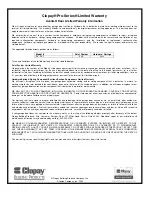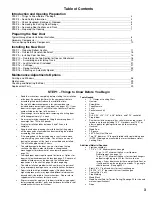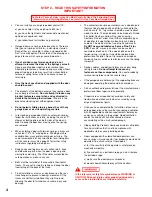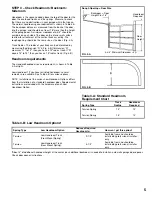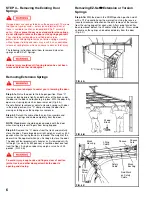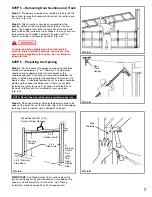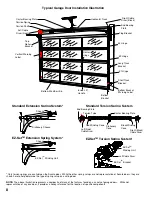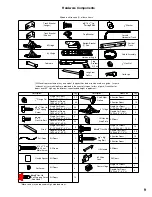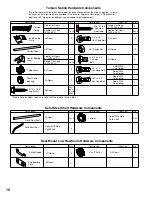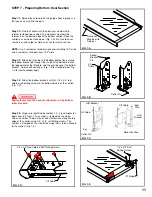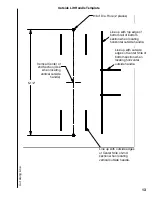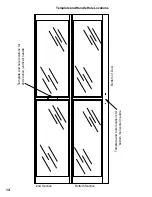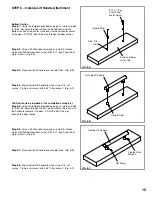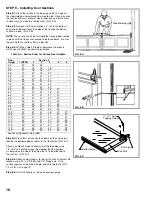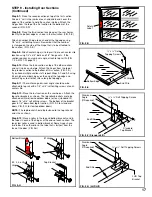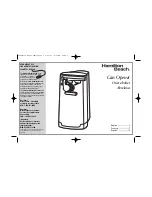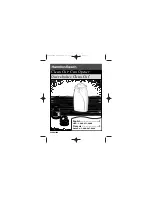
3
Table of Contents
Introduction and Opening Preparation
ST
EP 1 – Things to Know Before You Begin
3
STEP 2 – Read Safety Information
4
STEP 3 – Check Headroom, Backroom, Sideroom
5
STEP 4 – Removing the Existing Door Springs
6
STEP 5 – Removing Door Sections and Track
7
STEP 6 – Preparing the Opening
7
Preparing the New Door
Typical Garage Door Installation Illustration
8
Hardware Components
9
Torsion Spring Hardware Components
10
Installing the New Door
STEP 7 – Preparing Bottom Section
11
STEP 8 – Outside Lift Handle Attachment
15
STEP 9 – Installing Door Sections
16
STEP 10 – Reinforcing the Top Section for Opener Attachment
18
STEP 11 – Assembling and Installing Track
19
STEP 12 – Lock Installation (if included)
21
STEP 13 – Pull Rope
21
STEP 14 – Spring Installation
22
STEP 15 – Attaching an Automatic Opener
27
Maintenance/Adjustments/Options
Painting and Windows
28
Maintenance
29
Checking and Adjusting the Door
29
Replacement Parts
29
STEP 1 – Things to Know Before You Begin
Read the instructions completely before starting the installation
of the door. Becoming familiar with the components before
assembling the door will reduce the installation time.
Be sure all hardware components for your new door are
included before removing existing door (see pages 6,7). If your
door is missing any parts, call the toll-free Consumer Services
number listed on the front of this manual.
Allow enough time to do the work; removing an existing door
will take approximately 1-3 hours.
An assistant may be required for lifting the unsprung door. It
can weigh from 100 to 800 pounds.
A typical installation takes between 9 and 12 hours to
complete.
Keep in mind when planning the installation that the garage
will be open and unsecured when disassembling the old and
assembling the new door.
If the garage door is the only opening in the structure make
sure everything you need is inside. You will have no way of
leaving the garage until the track is assembled and installed.
This will take approximately 5 hours.
To avoid damage to the door, you must reinforce the top
section of the door in order to provide a strengthened
mounting point for attachment of an automatic opener (see
page 18).
Low Headroom doors require special instructions. Options for
doors with low headroom can be found on page 5. Purchase of
additional hardware may be required. Check headroom
requirements in the chart on page 5 before beginning.
To avoid installation problems which could result in personal
injury or property damage, never reuse old track or hardware.
Doors installed in high windload regions (Florida and other
high wind prone areas) may require additional reinforcement
beyond what is detailed in these instructions. Please refer to
supplemental instructions for these areas.
Express warranties apply only to doors installed using original,
factory-supplied sections, parts, and hardware installed in strict
accordance with these instructions.
Tools Needed
“C” Clamps or Locking Pliers
Hammer
Screwdriver
Tape Measure
Level
Socket wrench kit
Pliers
Drill, 9/64”, 3/16", 1/4", & 3/8" drill bits, and 7/16" socket bit
Step ladder
Saw horses (with carpet or other soft material on top surface; 2
for doors up to and including 10’0”, 3 for doors over 10’0”) or
other supports for placing section on while assembling
Hacksaw
Wood Saw
T-Square
3/32” Allen (Hex) Wrench
Two 1/2" diameter, 18" long cold rolled solid steel winding bars
(NOTE: Winding bars are available at most hardware stores)
Locking Pliers
Additional Material Required
Light household oil
1-1/4" x 1-1/4" Minimum punched angle
- 13 ga. (3/32") minimum thickness for Operator
Reinforcement (see page 18)
- 16 ga. (1/16") minimum thickness for rear track hangers
on doors weighing up to 300 lbs. that use torsion
springs. If your door exceeds these weight limitations, or
if you do not know the weight of your door, 13 ga. angle
should be used. (See page 20)
Eight 3/8" x 1" bolts and nuts for rear track hangers
Six 5/16" x 11/2" lag screws for rear track hangers
Twelve 10d 3" nails
Stop Molding
Wood Block
Wood Anchor Pad for Torsion Spring (See page 20 for size and
material specifications)
Rope


